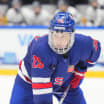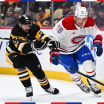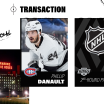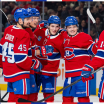The Class of '93
Members of the 1993 Stanley Cup Champion Montreal Canadiens discuss their legendary playoff run
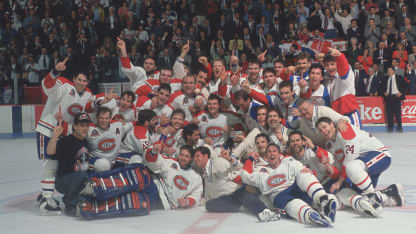
© B Bennett/Getty Images
A lot can happen in two-and-a-half decades. Like anyone who has ever reunited with former classmates over plastic cups of punch in their old high school gymnasium, the Habs' Class of '93 knows full-well how quickly time can fly.
"I didn't realize it's already been over 25 years since we won the Cup," admitted Brian Bellows, who now works as a broker for an investment firm in Minneapolis, MN. "My God, does that ever make me feel old."
"I can't believe it's been 25 years; that's half my life! I'm 47 years old now," echoed Patrice Brisebois.
The players themselves may be feeling a little long in the tooth, but they aren't the only ones who have grown a little older and wiser since enjoying their celebratory parade down Sherbrooke Street; many of the fans who lined the route that June also have a little more salt than pepper in their hair these days. While some Habs fans could still give a play-by-play of every shift of those playoffs starting with the series against the Nordiques, others were still just twinkles in their fathers' eyes at the time.
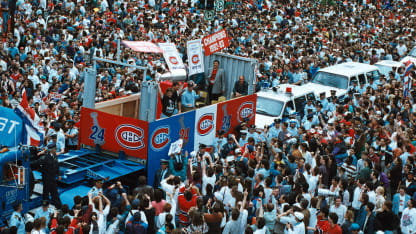
© 1996-98 AccuSoft Inc., All rights reserved
"What I've really noticed is that kids today know me from stories their parents have told them," confessed
current RDS analyst Vincent Damphousse with a laugh. "That's when it really hits you that it's been more than 20 years and you're not even in the same generation anymore."
The 1992-93 season marked the beginning of a new era in Montreal. Following Pat Burns' departure
for Toronto, then-Habs GM Serge Savard turned to Jacques Demers to lead the Canadiens to the promised land. Despite inheriting a team that hadn't made it past the second round for three straight years, the veteran bench boss made a bold declaration at his first team meeting.
"At the start of training camp, I told the players we were going to surprise the entire hockey world and win the Stanley Cup," Demers, who became a member of the Senate of Canada in 2009, divulged to CANADIENS Magazine in 2013. "I had confidence in that group of players. Yes, I had the best goaltender in the NHL and I had an extraordinary captain in Guy Carbonneau, but the biggest thing I knew I had was a team with a lot of character."
There may have been a fresh voice filled with optimism leading the charge, but some of the players
still weren't sure what to make of how high the bar was being set for them that season.
"I remember when Jacques came out on the ice for our first practice and said that, we all just looked at each other with these confused expressions and wondered if maybe we hadn't heard him correctly or something," joked Hall-of-Fame netminder Patrick Roy, who won his first Stanley Cup with the Canadiens in his rookie season, in 1986.
"I really didn't think we had the team to go all the way that year, to be honest," admitted Jean-Jacques
Daigneault, who returned to Montreal as an assistant coach from 2012-2018. "A few of the seasons before that, maybe, but not in 1993."
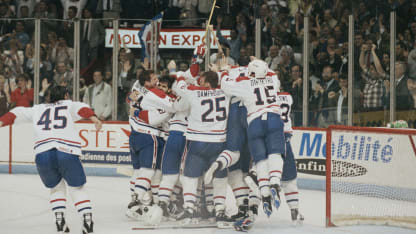
That campaign wasn't without its ups and downs, but Demers still managed to lead his troops to a 102-point season in '92-93 - good for a fifth-place finish in the Prince of Wales Conference. A tough home stretch in the schedule resulted in the Canadiens limping to the finish line with five losses in seven games and a handful of doubts heading into the postseason. While out for a drive a few days before the first round, the veteran bench boss realized the perfect way to get his team back on track was coming at him in surround sound.
"Just as the playoffs were about to start, I heard the song 'Nothing's Gonna Stop Us Now' by Starship," recalled Demers. "I went to my captains, Carbo, [Kirk] Muller, Damphousse, Roy and [Mike] Keane, and I asked them what they thought about playing that song before each of our games. Like the song says, 'We can build this dream together…nothing's gonna stop us now.' The guys liked the idea."
The musical stylings of their coach-turned-dressing-room-DJ may have surprised some of the players - especially since the song had been released six years earlier - but the underlying message was received loud and clear.
"Before every game, two or three minutes before we went on the ice, Jacques played that song to get us motivated," shared Brisebois of one of his coach's many inspirational strategies. "To this day, when I hear that song on the radio, all those memories come flooding back."
The strength of the bond the team shared that year was a big reason the Habs were so hard to beat. But adding a new track to the CD player was far from the only trick Demers had up his sleeve. Just in case his players had forgotten his unconventional message from training camp, he had a little reminder printed up for each of them.
"Jacques gave us all a little card with the inscription, 'Teamwork: coming together is the beginning, keeping together is progress, working together is success' written on it. Every guy got one with his initials written in the corner and we had to keep it with us at all times," explained Carbonneau, who still has that card in his possession 24 years later. "When you're in the playoffs, it's two months of hard work and players spend almost every single minute together."
Their bond off the ice translated to their performance on it, helping the Habs register a league-record 10-straight overtime victories that spring. Having made quick work of their opponents in every round save their six-game series against Quebec, the Canadiens often found themselves with some extra time to kill while awaiting their next opponent.
"I remember we stayed at a hotel before every game. After we had eliminated Buffalo in the second round, we were all watching Game 7 between the Islanders and the Penguins," revealed Daigneault. "When New York scored in overtime, three-quarters of us came bursting out into the halls to celebrate. We really didn't want to go up against one of the best teams in the league with guys like [Mario] Lemieux, [Jaromir] Jagr, [Ron] Francis, [Rick] Tocchet, etc."
Opportunities to flood the halls of the hotel didn't present themselves as often as the players would have liked. Spending night after night away from family and friends could have proven to be a drag, but instead the players used the time to build chemistry in a unique way. And when you leave a group of two dozen hockey players to their own devices, you never know what will happen…
"We were getting bored with having nothing to do at the hotel, so one day we started having water fights in the halls. It was pretty small at the beginning; I went after Rob Ramage, Mike Keane and Lyle Odelein with glasses of water. But then more and more guys started joining us," admitted current Canadiens' associate coach, Kirk Muller. "We were like a bunch of kids. And it wasn't just on the road, because we were staying in hotels the night before home games, too. We had to entertain ourselves because the playoffs are long if you don't. We did that throughout the entire postseason.
"When we got to the Finals, Jacques decided to come stay with us on our floor," he continued. "One night he came out and was shocked to find himself caught in the middle of a huge water fight and he was livid the next morning. He brought us in and said, 'Guys, we're in the Stanley Cup Finals. We haven't won anything yet and here you are acting like a bunch of children!' When I told him we'd been doing it every round, he laughed and just said, 'Well then, keep it up!'"
Demers had no intention of messing with any existing extracurricular activities given his team had racked up just three losses heading into the Finals. He knew he would need the stars to align just so if he had any hope of slowing down Wayne Gretzky and the Kings.
Eric Desjardins' hat trick in Game 2, Patrick Roy's wink in Game 4 and John LeClair's clutch performances to help bring the streak to 10 overtime wins are just a few of the moments that still resonate from that series. But the one moment engraved in the memories of Kings players two decades later is the "McSorley Incident".
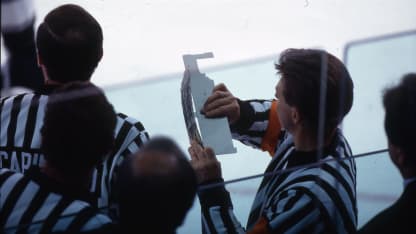
"During the first game of the Finals, a few players mentioned to me that Marty McSorley was playing with an illegal curve. During Game 2, we were losing 2-1 near the end of the game so I took a chance and called for his stick to be measured," explained Demers of the controversial call that led to Desjardins scoring the equalizer on the ensuing power play. "People in Los Angeles were up in arms about it, but I was just doing my job. It was the attention to detail by guys like Guy Carbonneau and Vincent Damphousse that made me aware of the situation."
The Canadiens won that second game in overtime and never looked back. While Patrick Roy's Conn Smythe-winning heroics still garner most of the credit for bringing a 24th Stanley Cup to the Canadiens, the players themselves insist the only way to win it all is to have everyone pulling in the same direction.
"Someone new rose up every night; everyone accepted their role and fulfilled it," stressed Damphousse, who led the team in scoring that postseason. "Jacques was great at communicating what he expected from each of us and how we were all integral to the team's success. Whether it was a guy like Mario Roberge, who didn't play a ton, or guys like me and Patrick who were used a lot more, the reason we won was we played as a team."
Having spent the seven years since 1986 waiting for another chance to celebrate, Habs fans spilled onto the streets of Montreal following the Canadiens' Game 5 triumph, leading to riots outside the Forum. With his team unable to make a safe exit, Serge Savard - a veteran of Stanley Cup celebrations himself - got to work organizing a party to help his players savor the moment as a family.
"The riots outside were terrible, but there was actually a silver lining there for us," explained Bellows. "Instead of leaving the rink and heading to some bar to be surrounded by a bunch of strangers, we were celebrating together with just the boys and the people we cared about the most. It wasn't something we had planned in advance, but it was incredible."
The raucous celebrations outside the building kept the party inside raging on until early morning. That
gave a few players an extra opportunity to let reality sink in.
"I remember going and sitting in the stands with Mike Keane a few hours after the game had ended," recalled Muller, who scored the Cup-clinching goal in Game 5.
"We were sitting there, side-by-side with a beer in one hand and a cigar in the other, looking at the empty arena and we were like, 'Oh my God. We just won the Stanley Cup.'"
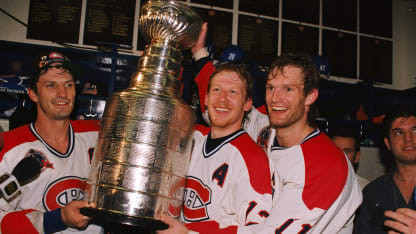
© 1996-98 AccuSoft Inc., All rights reserved
Long after the final bottles of champagne had been emptied and the last pieces of confetti along the parade route swept up, the celebrations continued well into the offseason. The bonds forged by the members of the Class of '93 were special and over 20 years later, they're still as strong as ever.
"You go to war with each other; you learn more about those guys and you create a bond with those guys that's stronger than you can imagine," confirmed Carbonneau. "I've had some great teammates over the years, but none of them are as close to me as the guys I won with."
"I used to cross paths with Vincent and Carbo on [RDS talk show] l'Antichambre from time to time and it's unbelievable," said Roy of the bond he still shares with those teammates today. "[Winning a championship] is not something that happens every year. It's an incredibly tough road for any team that hopes to do it. You have to have that confidence and that unique, unbreakable bond. We had that that year."
If the players enjoy getting together to talk about the "good old days", the fans are still ready to show appreciation to their heroes for that conquest more than two decades later. The most passionate fans in the game, Montrealers know how to make a player feel special.
Like a proud teacher watching his students cross the stage in their caps and gowns on graduation day, the man who led that group of men to the top will never forget the feeling he had the day he watched his
training camp promise come true.
"There truly is no better city in the world to win," confirmed Demers. "It was absolute euphoria here in 1993. No matter where we went, the golf course, a restaurant - you name it - people wanted to say thank you. We were congratulated everywhere we went.
"I've never experienced another summer quite like that," he finished. "Talking about it now brings me
back. Reliving those memories makes me feel young again."
++++
Some dates have been updated in this article, which originally appeared in the 2012-13CANADIENSYearbook.

